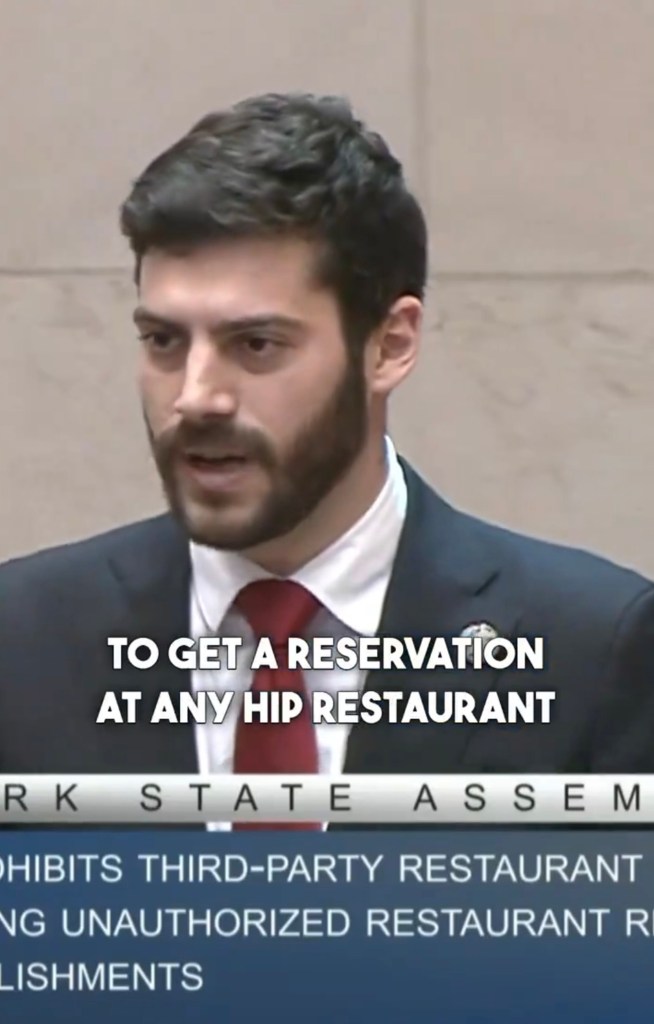NY bill bans selling hot restaurant reservations for up to $650 on the ‘black market’
They’re taking “black market” reservations off the menu.
Reselling hard-to-get bookings at elite Big Apple restaurants would be banned under a new bill that aims to crack down on internet hustlers who block New Yorkers from their favorite eateries by scalping dinner reservations like concert tickets.
The legislation would fine the middlemen — some of whom make as much as $70,000 a year — for booking hard-to-get mealtimes on websites such as Resy and OpenTable and then reselling them without the restaurant’s permission, said Assemblyman Alex Bores (D-Manhattan).
The prices range from $340 for a scalped spot at the fashionable Italian red sauce joint Carbone to $650 at the trendy Polo Bar.
And that’s before even paying the price for the meal.
“It is absolutely absurd,” Bores, who sponsored the state bill, said of the practice. “[It] stops the family that wants to go out for a special meal to celebrate a graduation, or the couple that wants to celebrate an anniversary.”
“[Resellers] are getting in the way of New Yorkers going to their favorite restaurant,” he added, calling the market “nefarious.”
Dubbed Restaurant Reservation Anti-Piracy Bill, the legislation also helps prevent “no shows” when food world “scalpers” fail to resell seats at tables on websites such as Appointment Trader.
Melissa Fleischut, President of the NY Restaurant Association, said ditched reservations have tripled in recent months due to the resellers, burning workers ranging from servers to chefs.
“It’s a significant impact on a restaurant that’s trying to make good money, pay their staff, keep everybody employed, pay their bills,” said Fleischut, who supports the bill.
Andrew Rigie, Executive Director of the New York City Hospitality Alliance, said the bill would help crack down on the practice.
“Restaurant reservation scalping has been an issue that’s gone on for many years. But the rise of third party websites that facilitate the scalping have made the issue explode,” he said. “So if we can ban them, it will reduce the unauthorized sale of reservations.”
The bill has passed through the houses of the state legislature and must either be signed or vetoed by the Governor by the end of the year.
It establishes fines for “third-party restaurant reservation services” that arrange “unauthorized reservations with food service establishments.”
Customers at Big Apple eateries cheered the bill as a bid to level the culinary playing field.
“It’s good that it’s banned,” said Will Levi, 34, who was dining at Cafe Dante in the West Village Thursday. “It gives very rich people an edge over people who just wanna go to the restaurant they like, and who can’t spend extra money just to get there.”
Some black market sellers have made a career out of snapping up reservations at New York City hotspots such as the Italian eatery Carbone in the West Village, Maison Close in Soho and Ralph Lauren’s Polo Bar in Midtown.
On Thursday, dinner reservations at Carbone were selling for roughly $150 to $450 on Appointment Trader.
Others diners called reservation resales an unfair use of technology.
“The people that are buying and reselling the reservations are using computer software to get the reservation immediately before any human being can get their hands on it,” said George Kyriakos, 55, who was dining at Carbone Thursday evening.
“So regular people who want a reservation at Carbone don’t have a chance.”
Get all the stories that move New York to your inbox
Sign up for our Metro Daily newsletter!
Thanks for signing up!
Ganesh Vilas Ubale, the general manager of the South Indian restaurant Semma — where the reservation waiting list is 1,151 names long — also praised the bill, saying it will make dining out more affordable.
“We are very happy and elated that it has been passed. That everyone has accepted it, including all the restaurants. It’s going to work in our favor,” he said.
“When I first heard about these black market sales, oh my God,“ he said. They were charging people like crazy.“
In May, reps from Resy along with more than a dozen restaurateurs wrote a letter in support of the bill, saying it would “protect consumers but also support the sustainability of small business and the restaurant industry.”
Carbone, Polo Bar and Maison Close didn’t return The Post’s requests for comment Friday.
-Additional reporting by Valentina Jaramillo









